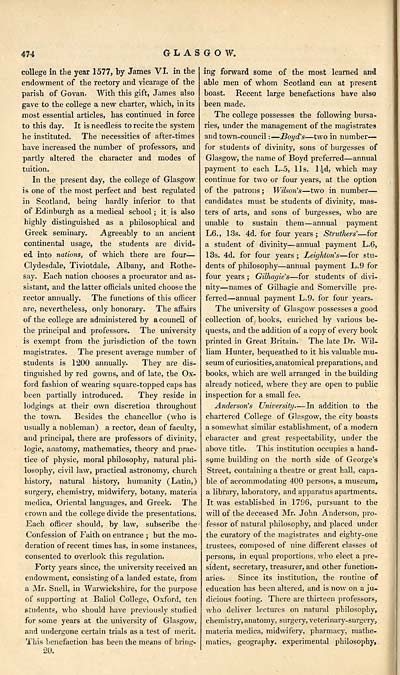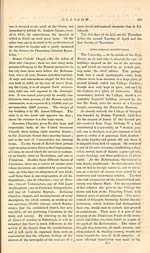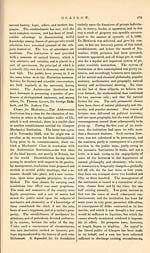Gazetteer of Scotland > Volume 1
(510) Page 474
Download files
Complete book:
Individual page:
Thumbnail gallery: Grid view | List view

474
GLASGOW.
college in the year 1577, by James VI. in the
endowment of the rectory and vicarage of the
parish of Govan. With this gift, James also
gave to the college a new charter, which, in its
most essential articles, has continued in force
to this day. It is needless to recite the system
he instituted. The necessities of after-times
have increased the number of professors, and
partly altered the character and modes of
tuition.
In the present day, the college of Glasgow
is one of the most perfect and best regulated
in Scotland, being hardly inferior to that
of Edinburgh as a medical school ; it is also
highly distinguished as a philosophical and
Greek seminary. Agreeably to an ancient
continental usage, the students are divid-
ed into nations, of which there are four —
Clydesdale, Tiviotdale, Albany, and Rothe-
say. Each nation chooses a procurator and as-
sistant, and the latter officials united choose the
rector annually. The functions of this officer
are, nevertheless, only honorary. The affairs
of the college are administered by a council of
the principal and professors. The university
is exempt from the jurisdiction of the town
magistrates. The present average number of
students is 1200 annually. They are dis-
tinguished by red gowns, and of late, the Ox-
ford fashion of wearing square-topped caps has
been partially introduced. They reside in
lodgings at their own discretion throughout
the town. Besides the chancellor (who is
usually a nobleman) a rector, dean of faculty,
and principal, there are professors of divinity,
logic, anatomy, mathematics, theory and prac-
tice of physic, moral philosophy, natural phi-
losophy, civil law, practical astronomy, church
history, natural history, humanity (Latin,)
surgery, chemistry, midwifery, botany, materia
mediea, Oriental languages, and Greek. The
crown and the college divide the presentations.
Each officer should, by law, subscribe the
Confession of Faith on entrance ; but the mo-
deration of recent times has, in some instances,
consented to overlook this regulation.
Forty years since, the university received an
endowment, consisting of a landed estate, from
a Mr. Snell, in Warwickshire, for the purpose
of supporting at Baliol College, Oxford, ten
students, who should have previously studied
for some years at the university of Glasgow,
and undergone certain trials as a test of merit.
This benefaction has been the means of bring-
20.
ing forward some of the most learned and
able men of whom Scotland can at present
boast. Recent large benefactions have also
been made.
The college possesses the following bursa-
ries, under the management of the magistrates
and town-council : — Boyd's — two in number—
for students of divinity, sons of burgesses of
Glasgow, the name of Boyd preferred — annual
payment to each L.5, Us. l|d, which may
continue for two or four years, at the option
of the patrons ; Wilson's — two in number —
candidates must be students of divinity, mas-
ters of arts, and sons of burgesses, who are
unable to sustain them — annual payment
L6., 13s. 4d. for four years ; Struthers' — for
a student of divinity — annual payment L.6,
13s. 4d. for four years ; Leighton's — for stu-
dents of philosophy — annual payment L.9 for
four years ; Gilhagie's — for students of divi-
nity — names of Gilhagie and Somerville pre-
ferred — annual payment L.9. for four years.
The university of Glasgow possesses a good
collection of books, enriched by various be-
quests, and the addition of a copy of every book
printed in Great Britain. The late Dr. Wil-
liam Hunter, bequeathed to it his valuable mu-
seum of curiosities, anatomical preparations, and
books, which are well arranged in the building
already noticed, where they are open to public
inspection for a small fee.
Anderson's University — In addition to the
chartered College of Glasgow, the city boasts
a somewhat similar establishment, of a modem
character and great respectability, under the
above title. This institution occupies a hand-
some building on the north side of George's
Street, containing a theatre or great hall, capa-
ble of accommodating 400 persons, a museum,
a library, laboratory, and apparatus apartments.
It was established in 1796, pursuant to the
will of the deceased Mr. John Anderson, pro-
fessor of natural philosophy, and placed under
the curatory of the magistrates and eighty-one
trustees, composed of nine different classes of
persons, in equal proportions, who elect a pre-
sident, secretary, treasurer, and other function-
aries. Since its institution, the routine of
education has been altered, and is now on a ju-
dicious footing. There are thirteen professors,
who deliver lectures on natural philosophy,
chemistry, anatomy, surgery, veterinary-surgery,
materia mediea, midwifery, pharmacy, mathe-
matics, geography, experimental philosophy,
GLASGOW.
college in the year 1577, by James VI. in the
endowment of the rectory and vicarage of the
parish of Govan. With this gift, James also
gave to the college a new charter, which, in its
most essential articles, has continued in force
to this day. It is needless to recite the system
he instituted. The necessities of after-times
have increased the number of professors, and
partly altered the character and modes of
tuition.
In the present day, the college of Glasgow
is one of the most perfect and best regulated
in Scotland, being hardly inferior to that
of Edinburgh as a medical school ; it is also
highly distinguished as a philosophical and
Greek seminary. Agreeably to an ancient
continental usage, the students are divid-
ed into nations, of which there are four —
Clydesdale, Tiviotdale, Albany, and Rothe-
say. Each nation chooses a procurator and as-
sistant, and the latter officials united choose the
rector annually. The functions of this officer
are, nevertheless, only honorary. The affairs
of the college are administered by a council of
the principal and professors. The university
is exempt from the jurisdiction of the town
magistrates. The present average number of
students is 1200 annually. They are dis-
tinguished by red gowns, and of late, the Ox-
ford fashion of wearing square-topped caps has
been partially introduced. They reside in
lodgings at their own discretion throughout
the town. Besides the chancellor (who is
usually a nobleman) a rector, dean of faculty,
and principal, there are professors of divinity,
logic, anatomy, mathematics, theory and prac-
tice of physic, moral philosophy, natural phi-
losophy, civil law, practical astronomy, church
history, natural history, humanity (Latin,)
surgery, chemistry, midwifery, botany, materia
mediea, Oriental languages, and Greek. The
crown and the college divide the presentations.
Each officer should, by law, subscribe the
Confession of Faith on entrance ; but the mo-
deration of recent times has, in some instances,
consented to overlook this regulation.
Forty years since, the university received an
endowment, consisting of a landed estate, from
a Mr. Snell, in Warwickshire, for the purpose
of supporting at Baliol College, Oxford, ten
students, who should have previously studied
for some years at the university of Glasgow,
and undergone certain trials as a test of merit.
This benefaction has been the means of bring-
20.
ing forward some of the most learned and
able men of whom Scotland can at present
boast. Recent large benefactions have also
been made.
The college possesses the following bursa-
ries, under the management of the magistrates
and town-council : — Boyd's — two in number—
for students of divinity, sons of burgesses of
Glasgow, the name of Boyd preferred — annual
payment to each L.5, Us. l|d, which may
continue for two or four years, at the option
of the patrons ; Wilson's — two in number —
candidates must be students of divinity, mas-
ters of arts, and sons of burgesses, who are
unable to sustain them — annual payment
L6., 13s. 4d. for four years ; Struthers' — for
a student of divinity — annual payment L.6,
13s. 4d. for four years ; Leighton's — for stu-
dents of philosophy — annual payment L.9 for
four years ; Gilhagie's — for students of divi-
nity — names of Gilhagie and Somerville pre-
ferred — annual payment L.9. for four years.
The university of Glasgow possesses a good
collection of books, enriched by various be-
quests, and the addition of a copy of every book
printed in Great Britain. The late Dr. Wil-
liam Hunter, bequeathed to it his valuable mu-
seum of curiosities, anatomical preparations, and
books, which are well arranged in the building
already noticed, where they are open to public
inspection for a small fee.
Anderson's University — In addition to the
chartered College of Glasgow, the city boasts
a somewhat similar establishment, of a modem
character and great respectability, under the
above title. This institution occupies a hand-
some building on the north side of George's
Street, containing a theatre or great hall, capa-
ble of accommodating 400 persons, a museum,
a library, laboratory, and apparatus apartments.
It was established in 1796, pursuant to the
will of the deceased Mr. John Anderson, pro-
fessor of natural philosophy, and placed under
the curatory of the magistrates and eighty-one
trustees, composed of nine different classes of
persons, in equal proportions, who elect a pre-
sident, secretary, treasurer, and other function-
aries. Since its institution, the routine of
education has been altered, and is now on a ju-
dicious footing. There are thirteen professors,
who deliver lectures on natural philosophy,
chemistry, anatomy, surgery, veterinary-surgery,
materia mediea, midwifery, pharmacy, mathe-
matics, geography, experimental philosophy,
Set display mode to: Large image | Transcription
Images and transcriptions on this page, including medium image downloads, may be used under the Creative Commons Attribution 4.0 International Licence unless otherwise stated. ![]()
| Gazetteers of Scotland, 1803-1901 > Gazetteer of Scotland > Volume 1 > (510) Page 474 |
|---|
| Permanent URL | https://digital.nls.uk/97430482 |
|---|
| Description | Volume I: Abbey to Glenartney. |
|---|---|
| Attribution and copyright: |
|
| Description | By Robert Chambers and William Chambers. Glasgow: Blackie & Son, 1838. 2 volumes. |
|---|---|
| Shelfmark | NF.1461.g.7 |
| Additional NLS resources: | |

